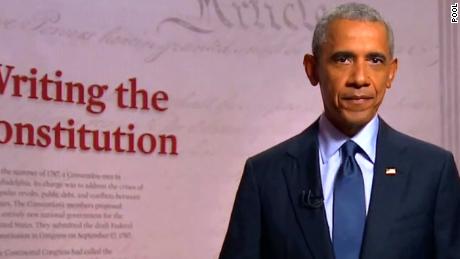
Friday
I was reminded of a John Dryden quotation that I had once applied to Barack Obama when a district judge recently wrote me about the post. I share it here, partly because it’s a gratifying response and in part because it’s relevant again given Obama’s speech last week targeting Donald Trump:
Dear Professor Bates,
Today I was angry with someone and, carefully nursing my sense of righteousness, again looked up one of my favorite quotations: “Beware the fury of a patient man.” I’m glad I looked it up for two reasons. First, it put some distance between me and the thing that angered me, and, once again, putting the brakes on before taking action saved me from some precipitous faux pas that I would have had to apologize for later. (But putting the brakes on (and being patient) does not mean having no memory; I’ll put this event in the mental file called “Fool me once . . . .”)
The second reason that I’m glad I looked it us is that it brought me to the essays in your blog, “Better Living Through Beowulf.” There I read your piece about the reaction of Obama to Boehner’s refusal to negotiate in the budget conflict. Your article discusses the Dryden quotation in the context of the debate. I enjoyed it very much…
The judge also mentioned his belief that, in an age when the law is under ceaseless attack, reading stories is one of the best ways to develop a sense of justice. Literature, he noted, specializes in showing us how humans work and how to solve human problems. Needless to say, I fully agree.
Regarding Obama, as is customary he has largely been silent about his successor. This has not been reciprocal, however, with Trump falsely accusing him of spying and claiming he was guilty of treason. In his convention speech, he had had it. The patient man was furious.
Obama started with a look back at the Constitution:
I’m in Philadelphia, where our Constitution was drafted and signed. It wasn’t a perfect document. It allowed for the inhumanity of slavery and failed to guarantee women — and even men who didn’t own property — the right to participate in the political process. But embedded in this document was a North Star that would guide future generations; a system of representative government — a democracy — through which we could better realize our highest ideals. Through civil war and bitter struggles, we improved this Constitution to include the voices of those who’d once been left out. And gradually, we made this country more just, more equal, and more free.
Then he set forth his charges:
[Joe Biden and Kamala Harris] understand that in this democracy, the Commander-in-Chief doesn’t use the men and women of our military, who are willing to risk everything to protect our nation, as political props to deploy against peaceful protesters on our own soil. They understand that political opponents aren’t “un-American” just because they disagree with you; that a free press isn’t the “enemy” but the way we hold officials accountable; that our ability to work together to solve big problems like a pandemic depends on a fidelity to facts and science and logic and not just making stuff up.
He followed it up with a challenge to the cynics amongst us:
Do not let them take away your power. Don’t let them take away your democracy. Make a plan right now for how you’re going to get involved and vote. Do it as early as you can and tell your family and friends how they can vote too. Do what Americans have done for over two centuries when faced with even tougher times than this — all those quiet heroes who found the courage to keep marching, keep pushing in the face of hardship and injustice.
Some commentators described the speech as a jeremiad, all the more startling because the conciliatory Obama does not normally speak this way. Many saw it as his angriest speech, some as his greatest. If it has any of its intended effect, Trump will have reason to beware.
In Dryden’s poem, the Obama figure is King David, an allegory for Charles II. You can read the detailed political history of the time in my post, but suffice it to say that, although he appeared to be an easy-going monarch, Charles could stand firm when the going got tough. That, at any rate, is how Dryden depicts him in the poem:
Thus long have I, by native mercy swayed,
My wrongs dissembled, my revenge delayed;
So willing to forgive the offending age;
So much the father did the king assuage.
But now so far my clemency they slight,
The offenders question my forgiving right.
That one was made for many, they contend;
But ’tis to rule, for that’s a monarch’s end.
They call my tenderness of blood my fear,
Though manly tempers can the longest bear.
Yet since they will divert my native course,
‘Tis time to show I am not good by force.
The poem’s best know line occurs further on:
Must I at length the sword of justice draw?
Oh curst effects of necessary law!
How ill my fear they by my mercy scan!
Beware the fury of a patient man.
Law they require, let Law then show her face;
They could not be content to look on Grace . . .
Obama no longer has the power he once had. Nor, as president, would he have been able to wield Charles’s sword of justice, which is the job of the (supposedly separate) Justice Department. His speech, however, may help bring about a better America.

